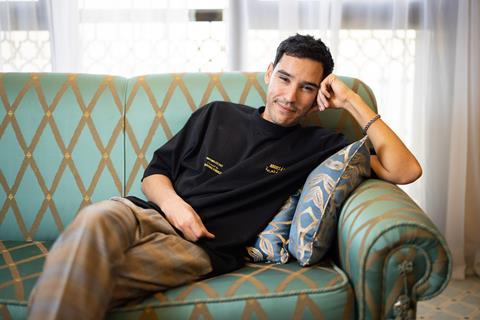
For his remarkable turn in Lotfy Nathan’s Harka, Adam Bessa won this year’s Cannes Un Certain Regard best performance award (tied with Vicky Krieps for Corsage).
“A huge responsibility” is how the actor describes playing the role of Ali, an impoverished street-seller whose predicament is inspired by Mohamed Bouazizi, whose self-immolation in the Tunisian city of Sidi Bouzid started a wave of protests in Tunisia and the Arab world in 2011. “Sometimes, as an actor, you have to give voice to people who cannot express themselves.”
That responsibility felt all the greater to Bessa, who was born in Paris, France, in 1992 to Tunisian parents – his loyalties are apparent when he admits he supported Tunisia against France in their game at the Qatar World Cup. “We spoke Arabic in the house,” he says of his childhood. “It was that duality.”
Bessa is open about the fact that his heritage could feel like a burden while he was growing up. “Being an Arab in the 2000s in Europe was not easy,” says the actor. But as he grew older and learned more about where he was from, his Arabic heritage – and that duality that once felt like an anchor – began to feel like a gift.
Taking the decision to quit law school and pursue his long-standing passion for cinema, Bessa bought a few books on acting and started to teach himself. As he developed his craft, he landed a few roles here and there until Algerian writer/director Sofia Djama cast him in Les Bienheureux in 2017. “And then it took off,” he says.
After a Cesar nomination for most promising actor for Les Bienheureux in 2018, Bessa landed the role of Kawa in Netflix’s Arabic-language war movie Mosul. He will next be seen reprising his role as soldier Yaz Kahn in a sequel to Netflix’s Chris Hemsworth-starrer Extraction, and in Meryam Jabour’s Motherhood, about a mother and daughter in an isolated Tunisian village.
Bessa says that, because of his heritage, the role in Harka became “an obsession. I was hardcore with myself and tried not to pity [Ali’s] sadness and show his dignity even if sometimes he was not nice. It was the first time I went deeply into method acting, and I stayed in character all the time during the shoot.”

























No comments yet